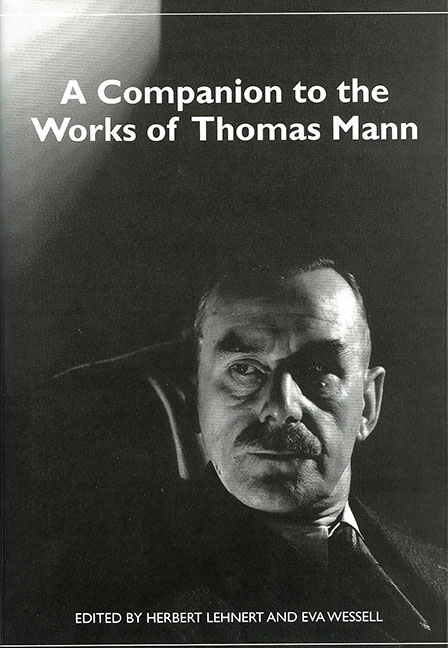Book contents
- Frontmatter
- Contents
- Foreword
- Thomas Mann's Works
- List of Abbreviations
- Introduction
- Thomas Mann's Beginnings and Buddenbrooks
- Art and Society in Thomas Mann's Early Novellas
- Love in Society: Thomas Mann's Early Stories
- “Death in Venice”
- “Mein ‘Friedrich’ — das ist was Anderes”: Thomas Mann's Unwritten Novel about Frederick the Great, King of Prussia
- Magic and Reflections: Thomas Mann's The Magic Mountain and His War Essays
- Thomas Mann's “Autobiographical” Stories
- Joseph and His Brothers
- Lotte in Weimar
- Thomas Mann's Late Politics
- “German” Music and German Catastrophe: A Re-Reading of Doktor Faustus
- The Gaze of Love, Longing, and Desire in Thomas Mann's “The Transposed Heads” and “The Black Swan”
- Felix Krull
- Female Identities and Autobiographical Impulses in Thomas Mann's Work
- Betrayed or Not Betrayed: A Testament?
- Thomas Mann's Comedies
- Notes on the Contributors
- Select Bibliography
- Index
Female Identities and Autobiographical Impulses in Thomas Mann's Work
Published online by Cambridge University Press: 28 April 2017
- Frontmatter
- Contents
- Foreword
- Thomas Mann's Works
- List of Abbreviations
- Introduction
- Thomas Mann's Beginnings and Buddenbrooks
- Art and Society in Thomas Mann's Early Novellas
- Love in Society: Thomas Mann's Early Stories
- “Death in Venice”
- “Mein ‘Friedrich’ — das ist was Anderes”: Thomas Mann's Unwritten Novel about Frederick the Great, King of Prussia
- Magic and Reflections: Thomas Mann's The Magic Mountain and His War Essays
- Thomas Mann's “Autobiographical” Stories
- Joseph and His Brothers
- Lotte in Weimar
- Thomas Mann's Late Politics
- “German” Music and German Catastrophe: A Re-Reading of Doktor Faustus
- The Gaze of Love, Longing, and Desire in Thomas Mann's “The Transposed Heads” and “The Black Swan”
- Felix Krull
- Female Identities and Autobiographical Impulses in Thomas Mann's Work
- Betrayed or Not Betrayed: A Testament?
- Thomas Mann's Comedies
- Notes on the Contributors
- Select Bibliography
- Index
Summary
The luxurious homes of the upper middle class during the Gründerjahre of the 1870s are known for their ornate exteriors and excessively adorned interiors. With their expensive wardrobes and jewelry that demonstrated their idleness and refined social graces, bourgeois wives were expected to enhance their families’ appearance of affluence; thus they functioned as part of the décor. Their daughters were to enter marriages advantageous to their families’ reputations. Usually their emotional and sexual desires were ignored or denied, not only by their families, but also often by themselves, as they valued an upper-class, privileged lifestyle over sexual independence. In 1851 Louise Otto-Peters had suggested that bourgeois women should pursue ennobling virtues such as unselfish love, passive compassion, moral purity, the “Eternal-Feminine,” making her equal, even superior to man. This emphasis on moral superiority as a compensation for their social and sexual compliance carried into the bourgeois women's movement in the 1890s because it focused largely on charitable institutions and welfare organizations. This movement, primarily organized by women from the well-to-do, educated segment of bourgeois society, also voiced demands for more changes, stressing women's needs for educational and professional opportunities. The majority of upper-class women remained silent. When their internalization of the repressive bourgeois code of sexual morality and patriarchal standards did not stop bourgeois mothers and daughters from rebelling, the fear of losing their social privileges, of being ostracized and alienated from their social milieu surely made them reluctant to fight. Only the most feminist-oriented among them were willing and prepared to embrace a bohemian existence; only a few exceptionally creative women earned recognition, short-lived though it often was, and an independent livelihood.
Thomas Mann grew up in this patriarchal world, which, despite growing demands for women's social, political, and cultural equality, was largely unaware of its anti-feminist, misogynist traditions. It is not difficult to find in his writings passages that echo this tradition. For instance, around 1904 Mann copied into his notebook the following sentence from a letter to his future wife Katia: “Only ladies and dilettantes bubble over [with creativity], only the quickly satisfied and ignorant, who do not live under the pressure and the discipline of talent.”
- Type
- Chapter
- Information
- A Companion to the Works of Thomas Mann , pp. 271 - 296Publisher: Boydell & BrewerPrint publication year: 2004

